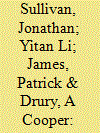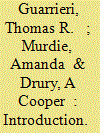|
|
|
Sort Order |
|
|
|
Items / Page
|
|
|
|
|
|
|
| Srl | Item |
| 1 |
ID:
076108


|
|
|
| 2 |
ID:
092260


|
|
|
|
|
| Publication |
2009.
|
| Summary/Abstract |
Much has been written on the triangular, and increasingly high-profile, China-Taiwan-US relations. However, scholars have yet to apply Diversionary Theory to the China-Taiwan dyad. DT argues that leaders may resort to international conflict when domestic political and economic situations become troublesome, aiming at directing public attention away from problems at home. While creation of explicit military conflict in the Taiwan Strait by Taipei is deemed quite unlikely, more subtle processes of diversion might be expected instead. This article applies a variant on DT to assess whether leaders in Taipei have used rhetoric about Taiwan independence or unification as a distraction from domestic problems during the years leading up to Taiwan's 2004 presidential election. We find that, as the president's approval sinks, pro-independence rhetoric becomes more likely. Overall, the results of this study confirm extension of DT to the case of Taiwan and encourage further research applied to middle powers.
|
|
|
|
|
|
|
|
|
|
|
|
|
|
|
|
| 3 |
ID:
102761


|
|
|
| 4 |
ID:
152810


|
|
|
|
|
| Summary/Abstract |
The 2016 Presidential Theme for the International Studies Association’s Annual Conference was “Exploring Peace.” This Presidential Special Issue presents some of the innovative ways that scholars are “exploring peace” as more than just the absence of war. In this Introduction, we outline the central ideas behind the theme and show how the research in this Special Issue represents a new way of conceptualizing and studying peace. By expanding the definition of peace beyond the absence of war, the articles in this Issue provide insights into the ways that people do and do not experience peace in their quotidian lives. The works also illustrate how a broader conceptualization of peace can contribute to both IR scholarship and practice.
|
|
|
|
|
|
|
|
|
|
|
|
|
|
|
|
| 5 |
ID:
109912


|
|
|
|
|
| Publication |
2011.
|
| Summary/Abstract |
Previous research, applying perfect deterrence theory, has demonstrated that national missile defense generally enhances the stability of deterrence, primarily because it makes the defender's retaliatory threat more credible. However, stability is not ensured, because missile defense has the potential to increase other states' dissatisfaction with the status quo. Consequently, dissatisfied states have an increased incentive to challenge the status quo, undermining deterrence stability. Although there is a lengthy literature debating this point, no one has conducted a rigorous empirical analysis of the impact of national missile defense on satisfaction. To address this significant gap in the literature, we analyze the impact of US missile defense programs on other states' status quo evaluations through analyses of events data, 1985-2004, and UN voting data, 1985-2008.
|
|
|
|
|
|
|
|
|
|
|
|
|
|
|
|
| 6 |
ID:
107924


|
|
|
|
|
| Publication |
2011.
|
| Summary/Abstract |
While economic sanctions are commonly regarded as nonviolent coercive diplomacy, scholars show that senders-particularly democratic senders-are actually more likely to use military force against the targets of their sanctions. In this article, the authors extend this connection between sanctions and military action by arguing that countries targeted with third-party economic coercion are more likely to be targets of dyadic militarized violence from states not involved in the sanctions. The act of sanctioning, the authors argue, lowers the prohibitions to use violence against the sanctioned state by others. Empirical analysis of dyadic data from 1914 to 2000 shows that, within directed dyads, militarized interstate dispute (MID) initiation is more likely when the potential target of conflict is sanctioned by third-party states, particularly when the sanctioning state is a large democracy.
|
|
|
|
|
|
|
|
|
|
|
|
|
|
|
|
| 7 |
ID:
057592


|
|
|
| 8 |
ID:
074652


|
|
|
|
|
| Publication |
2006.
|
| Summary/Abstract |
Recent literature argues that economic sanction threats should be more successful because both sender and target have an incentive to resolve their dispute before entering into costly sanction. Testing this assertion is somewhat problematic because threats are essentially nonevents-sanctions that were never deployed. This paper quantifies the U.S. threats to condition or revoke China's most favored nation status and shows that Washington's threats were not only ineffective but also counterproductive-Chinese accommodations decreased when the U.S. made acute threats but increased when Washington was cooperative. We conclude that for highly salient issues, sanction threats tend to be ineffective.
|
|
|
|
|
|
|
|
|
|
|
|
|
|
|
|
|
|
|
|
|